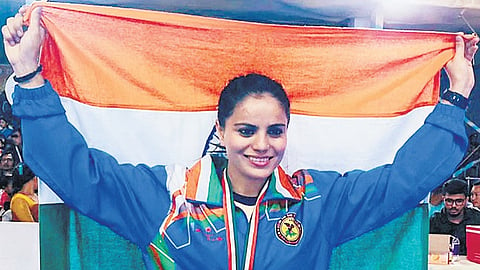

At the age of eight, a little girl rose for her turn. With a burst of speed, she sprinted towards the centre, deftly dodging the defenders. Her quick movements kept her opponents guessing as she circled the defenders, aiming to tag them with the ‘kho’. That little girl is now the captain of the Indian Women’s Kho Kho team. Delhi’s Nasreen Shaikh, 25, is also the second Kho Kho player in the last 25 years to receive the Arjuna Award, and the Kho Kho Federation of India (KKFI) has declared it will produce a biopic on her.
“Kho Kho is a sport that is connected with our mati (soil). Our culture teaches us to stay connected with the soil, even in movies, we see players carrying soil with them. In Kho Kho, soil is the only equipment we need, and we do not have to buy that. It is always with us,” she explains. As a child, Shaikh chose to play Kho Kho because it was the only sport that her family could afford her to play; Kho Kho being a sport that requires no equipment.
Against all odds
Shaikh is the fifth among 11 siblings, seven sisters and four brothers, with her father Mohammed Ghafoor being the only earning member till 2018. Ghafoor, now 50+, moved to Delhi in 1980 from Bihar’s Araria. He initially started as a utensils thekedaar (contractor), who would polish the utensils before they went out for sale. But he could not sustain his family on this and so began to run his shop of utensils in various haat bazaars. “He would set up his shops at various places in Delhi, on some days it would be in Inderlok, on other days, Nangloi. He travelled distances just so he could provide for us,” she says.
Even though Kho Kho needed no additional equipment, it did require a lot of training, a certain diet—this meant Gafoor had to work twice as hard. “He started setting up two shops in a day,” she says. Gafoor left the house at 7am to set up his shop at a flea market and once it was done, he would pack things up and rush to the next flea market happening somewhere else on the same day. He ended his day at 12am and started again at seven.
The pandemic days
“Seeing my father work this hard, I was more focused than ever on Kho Kho,” says Shaikh. Waking up at 5am, Shaikh’s day would begin with her field training and end with several rounds of Kho Kho practice, ending by 10 at night. Her hard work paid off when Shaikh’s captaincy struck gold for India at the South Asian Games in 2019. After that, there was no looking back. She made headlines in almost every newspaper and online media portal.
But the happy days were cut short; in March 2020, the country went into a lockdown due to the Covid-19 pandemic. The weekly markets were shut for almost two years. “While other sports players were offering funds to help people out, I, the captain of Indian Women’s Kho Kho team, who got the country a gold medal, was struggling, only because this sport does not get the recognition it should. Pandemic was one of the darkest days,” she laments.
A ray of hope
Despite it all, Shaikh did not give up on Kho Kho. In 2018, like many athletes, Shaikh too got a job. She joined the Airport Authority of India (AAI), at a monthly salary of Rs 26,000— AAI has a sports team— which helped her survive the pandemic. Furthermore, the KKFI also provided her with financial assistance of Rs 1 lakh. Knowing that right after the pandemic there would be matches for her to play, Shaikh too continued her workouts at home, in nearby parks and on her terrace. “Kho Kho is all about coordination and how fast you are. I would gather children from our neighbourhood, and would play Kho Kho on our terrace so I could brush up on my speed and coordination,” she explains.
After the pandemic, Shaikh participated in the 55th Senior Kho Kho National Championship in 2022, and secured gold again for India at the 4th Asian Kho Kho Championship, in 2023. Her perseverance has left a mark on many, including her youngest sister Afreen, 18, who, too, is training to become a Kho Kho player like Shaikh.
Shaikh, along with her training, is also simultaneously pursuing her master’s in physical education from Lovely Professional University. She hopes that her upcoming biopic will inspire many more young girls to participate in Kho Kho and play for the country.
“People used to question me when I would step out at 5am. Some of my relatives also said all sorts of things about the game and tournaments. They asked my parents, ‘Where does she go? Who does she stay with?’ But these same people are now talking highly of me. My Arjuna Award is the answer to all their questions,” she says.